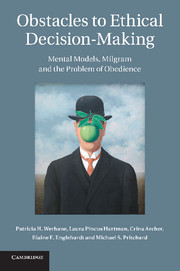Description
Obstacles to Ethical Decision-Making
Mental Models, Milgram and the Problem of Obedience
Authors: Werhane Patricia H., Hartman Laura Pincus, Archer Crina, Englehardt Elaine E., Pritchard Michael S.
An examination of how obedience affects and overpowers the ethics of decision-making in business, and how this can be overcome.
Language: English
Subject for Obstacles to Ethical Decision-Making:
Approximative price 48.38 €
In Print (Delivery period: 14 days).
Add to cart
Obstacles to Ethical Decision-Making
Publication date: 06-2014
Support: Print on demand
Publication date: 06-2014
Support: Print on demand
Approximative price 105.49 €
In Print (Delivery period: 14 days).
Add to cart
Obstacles to Ethical Decision-Making: Mental Models, Milgram and the Problem of Obedience
Publication date: 02-2013
260 p. · 15.5x23.1 cm · Hardback
Publication date: 02-2013
260 p. · 15.5x23.1 cm · Hardback
Description
/li>Contents
/li>Biography
/li>
In commerce, many moral failures are due to narrow mindsets that preclude taking into account the moral dimensions of a decision or action. In turn, sometimes these mindsets are caused by failing to question managerial decisions from a moral point of view, because of a perceived authority of management. In the 1960s, Stanley Milgram conducted controversial experiments to investigate just how far obedience to an authority figure could subvert his subjects' moral beliefs. In this thought-provoking work, the authors examine the prevalence of narrow mental models and the phenomenon of obedience to an authority to analyse and understand the challenges which business professionals encounter in making ethical decisions. Obstacles to Ethical Decision-Making proposes processes - including collaborative input and critique - by which individuals may reduce or overcome these challenges. It provides decision-makers at all levels in an organisation with the means to place ethical considerations at the heart of managerial decision-making.
1. Introduction; 2. The role of mental models in social construction; 3. The Milgram studies: obedience, disobedience, and ethical challenges; 4. Obstacles to ethical decision-making in the perception of ethical context; 5. Obstacles to ethical decision-making in impact analysis and action; 6. Managing ethical obstacles; 7. Problematic mental models: some applications; 8. Conclusion; Author index; Subject index.
Patricia H. Werhane is the Callista Wicklander Chair of Business Ethics and Director, Institute for Business and Professional Ethics at DePaul University. She is also Professor Emeritus at the Darden Graduate School of Business Administration at the University of Virginia. Her previous publications include Ethical Issues in Business, 7th edition (edited with Tom Donaldson and Margaret Cording, 2001).
Laura Pincus Hartman is Vincent de Paul Professor of Business Ethics at DePaul University's College of Commerce. She serves as Research Director of DePaul's Institute for Business and Professional Ethics. Her recent publications include Alleviating Poverty Through Profitable Partnerships (with Patricia H. Werhane, Scott Kelley and Dennis Moberg, 2009).
Crina Archer is a Ph.D. candidate in Political Science at Northwestern University, and a Senior Research Fellow to Vincent de Paul Professor Laura Hartman, and senior scholar with the Institute for Business and Professional Ethics, at DePaul University. She is the co-editor of Second Nature: Rethinking the Natural Through Politics (2013).
Elaine E. Englehardt is Distinguished Professor at Utah Valley University. Specializing in practical and professional ethics, she has authored and/or edited eight books.
Michael S. Pritchard is the Willard A. Brown Professor of Philosophy and Co-Director of the Center for the Study of Ethics in Society at Western Michigan University. His previous publications include Professional Integrity (2007) and The Ethical Challenges of Academic Administration (with Elaine Englehardt, Kerry Romesberg and Brian Schrag, 2010).
Laura Pincus Hartman is Vincent de Paul Professor of Business Ethics at DePaul University's College of Commerce. She serves as Research Director of DePaul's Institute for Business and Professional Ethics. Her recent publications include Alleviating Poverty Through Profitable Partnerships (with Patricia H. Werhane, Scott Kelley and Dennis Moberg, 2009).
Crina Archer is a Ph.D. candidate in Political Science at Northwestern University, and a Senior Research Fellow to Vincent de Paul Professor Laura Hartman, and senior scholar with the Institute for Business and Professional Ethics, at DePaul University. She is the co-editor of Second Nature: Rethinking the Natural Through Politics (2013).
Elaine E. Englehardt is Distinguished Professor at Utah Valley University. Specializing in practical and professional ethics, she has authored and/or edited eight books.
Michael S. Pritchard is the Willard A. Brown Professor of Philosophy and Co-Director of the Center for the Study of Ethics in Society at Western Michigan University. His previous publications include Professional Integrity (2007) and The Ethical Challenges of Academic Administration (with Elaine Englehardt, Kerry Romesberg and Brian Schrag, 2010).
© 2024 LAVOISIER S.A.S.



